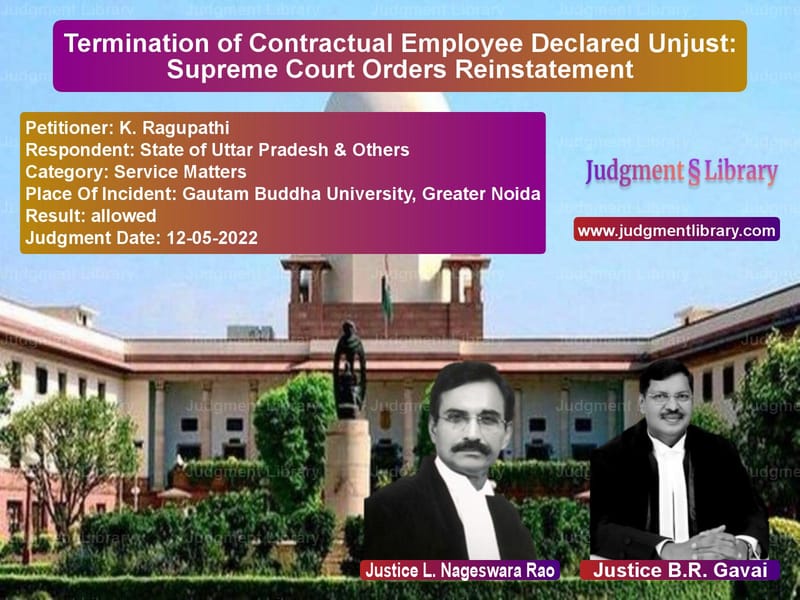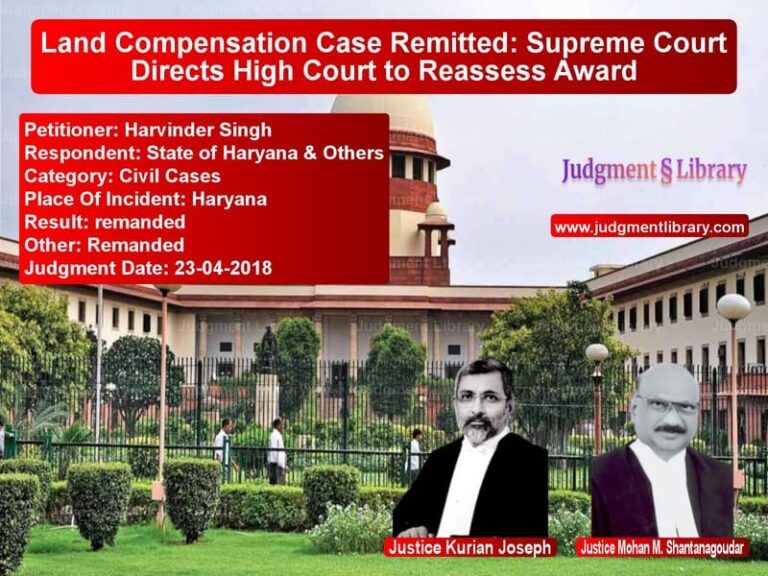Termination of Contractual Employee Declared Unjust: Supreme Court Orders Reinstatement
The case of K. Ragupathi vs. State of Uttar Pradesh & Others revolved around the unjust termination of a contractual employee at Gautam Buddha University, Greater Noida. The Supreme Court ruled that the termination was carried out without following due process, thereby violating the principles of natural justice. The Court ordered the reinstatement of the petitioner with continuity of service but denied back wages.
Background of the Case
K. Ragupathi was appointed as a Senior Scientific Officer at Gautam Buddha University through a selection process. Initially appointed on a contractual basis for two years in August 2011, his contract was extended for an additional year in August 2013. However, on August 12, 2014, the university informed him that his tenure had ended and he was to be relieved from service.
Ragupathi challenged this decision before the Allahabad High Court, arguing that his termination was arbitrary and punitive in nature. The High Court dismissed his petition, prompting him to approach the Supreme Court.
Key Legal Issues
- Whether a contractual employee is entitled to due process before termination.
- Whether the university’s action amounted to punitive termination.
- Whether the termination violated the principles of natural justice.
Arguments Presented
Petitioner’s Arguments (K. Ragupathi)
- He was appointed through a formal selection process and was not an ad-hoc employee.
- His performance was outstanding according to his Annual Performance Assessment Report (APAR).
- The termination was punitive in nature, as it was linked to an administrative warning issued by the university.
- The university failed to follow procedural fairness before discontinuing his services.
- Though appointed on a contractual basis, he was entitled to regular employee benefits such as leave, EPF, and annual increments.
Respondents’ Arguments (State of Uttar Pradesh & Gautam Buddha University)
- The petitioner’s contract was for a fixed term, and he had no right to claim continuation after expiry.
- The university had the authority to decide whether or not to extend the contract.
- The petitioner was involved in activities that were detrimental to the interests of the university, justifying his removal.
- The university was under no obligation to hold an inquiry before discontinuing a contractual employee.
Supreme Court’s Observations
The Supreme Court examined the affidavits and supporting documents, including the administrative warning issued to the petitioner. The key observations were:
- Selection process ensured employment legitimacy: The petitioner had been selected through a rigorous recruitment process.
- Employment terms mimicked regular service: Though technically a contractual employee, he received all benefits of a regular employee.
- No proper reason for termination: The petitioner’s performance was rated outstanding, and his integrity was noted to be good.
- Link between termination and administrative warning: The termination appeared to be in retaliation for internal conflicts rather than due to non-renewal of contract.
- Principles of natural justice were violated: The university failed to conduct an inquiry before discontinuing his services.
Key Excerpts from the Judgment
The Supreme Court stated:
“Though the employment was contractual, the employee was entitled to get all the benefits of a regular employee. His services could not have been terminated without following the principles of natural justice.”
Further, the Court observed:
“The termination was not a simple expiry of contract but was linked to an administrative warning issued earlier, making it a punitive action disguised as non-renewal.”
Final Verdict
The Supreme Court quashed the termination and directed that:
- The petitioner must be reinstated with continuity in service.
- No back wages would be awarded.
- The petitioner’s employment status would be determined in accordance with the university’s policies on regularization.
Outcome: The ruling reinforces the need for procedural fairness when terminating employees, even those on contractual terms.
Petitioner Name: K. Ragupathi.Respondent Name: State of Uttar Pradesh & Others.Judgment By: Justice L. Nageswara Rao, Justice B.R. Gavai.Place Of Incident: Gautam Buddha University, Greater Noida.Judgment Date: 12-05-2022.
Don’t miss out on the full details! Download the complete judgment in PDF format below and gain valuable insights instantly!
Download Judgment: k.-ragupathi-vs-state-of-uttar-prade-supreme-court-of-india-judgment-dated-12-05-2022.pdf
Directly Download Judgment: Directly download this Judgment
See all petitions in Employment Disputes
See all petitions in Termination Cases
See all petitions in Judgment by L. Nageswara Rao
See all petitions in Judgment by B R Gavai
See all petitions in allowed
See all petitions in supreme court of India judgments May 2022
See all petitions in 2022 judgments
See all posts in Service Matters Category
See all allowed petitions in Service Matters Category
See all Dismissed petitions in Service Matters Category
See all partially allowed petitions in Service Matters Category







